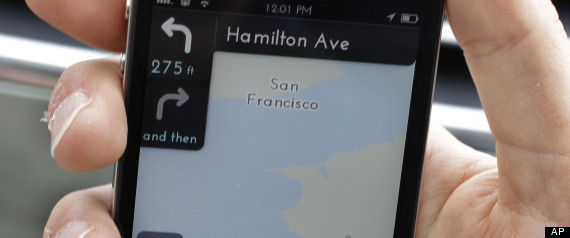Mobile Mapmakers Hope To Capitalize On Apple's Troubled Debut
Apple chief executive Tim Cook apologized Friday to customers for the widely criticized debut of his company's Maps app.
But to map developers, Cook could have simply said: "You’re welcome."
Apple's maps miscue has created a unique opportunity for lesser-known mapmakers to gain wider exposure. Several developers have reported spikes this week in downloads of their apps in Apple's App Store. Some have touted their services in blog posts or offered special promotions to capitalize on a rare moment when mobile phone users are seeking mapping alternatives.
Even Cook suggested on Friday that consumers should try other mapping services while Apple improves its own.
Analysts say mapmakers could stand to benefit from Apple's misfire in two ways. Apple may decide to partner with them to help fix gaps in its new application, or iPhone users may discover other maps by chance while looking for new options and continue using the applications.
"People used to be happy with the maps on their phones," said John Musser, founder of ProgrammableWeb, which tracks mobile app developers. "Now clearly people are frustrated with Apple maps and looking for alternatives, so there are opportunities for the smaller guys."
That opportunity arose last week when Apple unveiled its new mobile operating system, iOS 6. The platform did not feature the popular Google-built maps app. Instead, Apple released its own Maps app, which has been criticized for mislabeling cities and landmarks and not providing transit directions, among other things. Google is reportedly working on a version of its Maps app for iOS 6, but that is still months away.
The flaws with Apple Maps have sent iPhone users scrambling for other mapping options. Some have taken to Twitter to publish their discoveries.
One Twitter user wrote on Wednesday: “iOS 6 Maps silver lining: I discovered @LumaticInc’s elegant ‘City Maps” app for public transit. Huge step up from transit on Google Maps.”
Another wrote: “Dear frustrated #iPhone5 Apple maps users, I use @Telenav and @Scout on #iPhone4S -- they’re your map friend :)”
The negative reaction to Apple Maps has given the startup Lumatic the kind of exposure that no amount of marketing could have achieved, said the startup's chief executive, Scott Rafer.
The company creates mobile maps for pedestrians, cyclists and public transit users in 27 cities. But over the past week, Rafer said that frustrated iPhone users have sent him their zip codes and asked if Lumatic can add their town to its mobile maps.
"I want to exploit the hell out of this," Rafer said. "There is a crazy opportunity for us."
Some developers are hoping to capitalize on the attention by offering special promotions. This week, TeleNav said it would extend a free offer for its premium mapping app, called Scout, which offers turn-by-turn instructions with or without cellular reception. The app normally costs $25 in Apple's App Store.
"It seems to be working well," said Dariusz Paczuski, vice president of products for TeleNav. "We've seen downloads increase over the past few week."
Other companies have sought to remind iPhone users that they also offer a mapping service.
Bing proclaimed on its blog this week that its "apps have the essential search and mapping functionality you need.” And Foursquare released an update of its iPhone app this week, calling it "The Perfect Map." In a blog post, Foursquare said "we can also give you tailored suggestions instead of one size-fits-all results."
Foursquare did not mention Apple's Maps or other map developers by name. A Foursquare spokesperson said its updated app "has been in the works for a while."
Musser, of ProgrammableWeb, suggested that mapmakers -- both big and small -- should do everything they can to take advantage of this sudden public attention on mobile navigation.
“Put on your marketing hat and get out there and think of all the ways you can promote your app,” he said. “There’s never been a better time to get your name out there.”






I understand the reason why Apple divested itself from Google but it fouled up the maps. It wasn't ready for prime time. It is not even beta. They should have poured more resources and expertise into iOS maps before launching it.